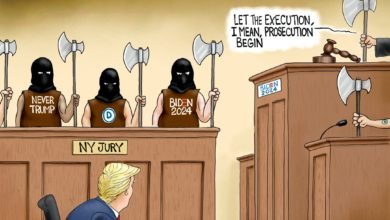Unintended Consequences In Politics

We ultimately want to understand the effects of unintended consequences inherent in all of politics. To do so we must first understand systems, feedback, and feedback loops. Unintended consequences are produced by feedback acting upon systems through feedback loops. But don’t go glassy eyed and skip to the examples. Understanding all this stuff, especially within the framework of politics and with recognizable examples, is pretty easy. Look at it this way: if you want to understand unintended consequences (and you do!), then you first have to understand this stuff.
Systems, Feedback, and Feedback Loops
A system is actually anything YOU define. However, to be useful, we need to examine some systems that have been defined by others, such as the laws within we are forced to work. We are familiar with our political system, the economic system (US and worldwide), the tax system, and the energy and the (subsidized) alternative fuel systems, just to name a few.
Above is a picture of a very simple system. All systems, regardless of complexity, have input(s), process(es), output(s), and feedback. Feedback is information about the output produced that can modify input(s) and/or process(es). The mechanisms for returning information are called feedback loops. There are two types of feedback loops – positive (reinforcing) and negative (controlling). BTW, the feedback loop names have no intrinsic value (they are just names), and a system may have any number of feedback loops.
As a familiar example, consider the negative feedback loop that keeps conditions within set limits. Your home heating system thermostat has a thermometer which detects when the temperature of your home drops below your desired temperature, which triggers a response – the heating is turned on. When your home is brought back to the desired temperature, the heating system is turned off. A positive feedback loop, however, leads to divergent behavior: indefinite expansion (a running away toward infinity), or the blocking of an activity (a running away toward zero). Each positive reaction involves another; there is a snowball effect. Examples include population explosion, industrial expansion, capital invested at compound interest, and inflation.
So the “system” is the law passed by politicians. People then look at feedback loops (positive or negative or both) that will allow them to circumvent the law. Unintended consequences arise when people circumvent the law by using feedback loops not thought of by the politicians who passed the law. Some examples are cited below.
Unintended Consequences
The law of unintended consequences was first defined by sociologist Robert K. Merton in 1936, in an article, The Unanticipated Consequences of Purposive Social Action, which covers different ways that actions, particularly those taken on a large scale, such as by governments, may have unexpected consequences. Two reasons why the law of unintended consequences works is that the framers of a social change (laws) are either ignorant of possible far reaching effects of the law, or make errors when they develop a change that don’t have the effects they desired. Economists and other social scientists have heeded its power for centuries. For just as long, politicians have ignored it.
Unintended consequences can be grouped into three types:
- A positive, unexpected benefit (usually called a windfall).
- A negative, unexpected detriment occurring in addition to the desired effect of the policy (CAFE, designed to increase fuel mileage, but causing cars to be smaller and lighter, increasing crash deaths).
- A perverse effect contrary to what was originally intended (when an intended solution makes a problem worse, such as when a policy has a perverse incentive that causes actions opposite to what was intended).
The law of unintended consequences is a warning that an intervention in any complex system can create unanticipated and often undesirable outcomes. Similar to Murphy’s law, it is used as a warning against the hubristic belief that humans can completely control the world around them.
Examples in Politics
In the economic downturn of 2008, the US central bank undertook a series of what they considered “positive initiatives” to stimulate the economy. Fed Chairman Ben Bernanke defended his position by saying that the policy of “quantitative easing” (bond purchasing), will “stimulate the economy and create jobs.” It did not. The unintended consequence of these initiatives are proving to be catastrophic to the economy and employment.
In a famous example, welfare programs, designed to aid families in economic distress led to the unintended consequence of some folks deliberately staying on welfare and “abusing the system.” This led to welfare reform when people were given a limited time to get off welfare rolls. An unintended consequence of welfare reform was the hardship it placed on many single mothers. Since they had to return to work, and they still might lack training to take on high paying work, they had to struggle to find childcare that would be inexpensive enough. Some women who participated in the US welfare to work program found themselves in even greater poverty once they began to work, and the need for inexpensive childcare placed an undue burden on the childcare system.
The law of unintended consequences provides the basis for many criticisms of government programs. Unintended consequences can add so much to the costs of some programs that they make the programs unwise even if they achieve their stated goals. Social Security has helped alleviate poverty among senior citizens. Many economists argued that it has carried a cost that goes beyond the payroll taxes levied on workers and employers. Economist Martin Feldstein and others maintain that today’s workers save less for their old age because they know they will receive Social Security checks when they retire. If Feldstein and the others are correct, it means that less savings are available, less investment takes place, and the economy and wages grow more slowly than they would without Social Security.
The law of unintended consequences is always at work and is everywhere. People outraged about high prices of fuel delivered in Iraq in the early days of the Iraq war advocated price controls to keep the prices closer to usual levels. An unintended consequence was that suppliers of fuel, who would have been more than willing to supply fuel quickly at the higher market price, were less willing to do so at the government controlled price. The result was a shortage of fuel where it was badly needed.
Government licensing of electricians is another example. It keeps the supply of electricians below what it would otherwise be, and keeps the price of electricians’ services higher than they would otherwise be. One unintended consequence is that people sometimes do their own electrical work, and, occasionally, one of these do-it-yourselfers is electrocuted.
The Result
“Systems,” as are laws passed by politicians, are ubiquitous – we cannot avoid them. The results, as we have seen above, fall into three categories, usually (for us cynics) the third one. So what can we do to protect against unintended consequences? Well… nothing, really. We are all human, and humans make mistakes. So our best protection is to elect politicians who use the KISS (Keep It Simple Stupid) method to draft laws. Simple systems (and laws) have a much better chance of NOT having unintended consequences identified. (Can anyone here say anything about the 2000+ page Obamacare bill?)
But that’s just my opinion.



